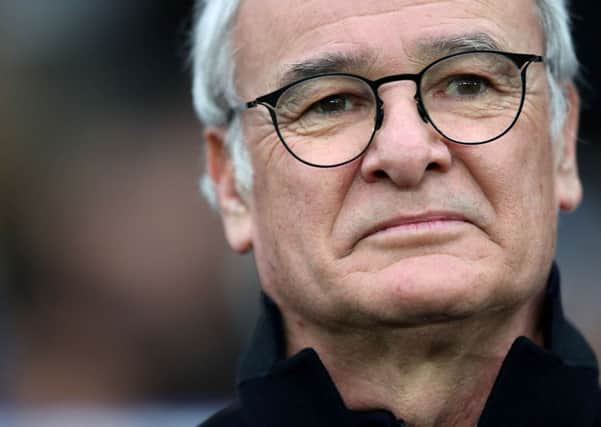Neil McNicholas: Claudio Ranieri is the victim of a funny old game called player power


Thierry Henry, on the sports news channel, suggested that if a manager like Ranieri has to go, then the entire squad should go with him, but that realistically isn’t going to happen – the team can’t be sacked and therefore the manager is the one that has to go. How ridiculous is that?
Let’s say there is a company manufacturing cars, and all of a sudden the doors are falling off, or the wheels come loose, or the engine develops faults. You don’t fire the manager – you find out who was doing the substandard work and he or she is the one given the sack. Firing the manager doesn’t take care of the problem – the doors and wheels will continue to fall off because the incompetent employees are still on the job.
Advertisement
Hide AdAdvertisement
Hide AdRanieri is doing the same job he did so brilliantly last season – that hasn’t changed. What has changed, where the wheels have come off, is the performance on the field, and once the players cross the white line, there’s not a lot the manager can do – it’s up to the so-called professionals who are, after all, being paid a lot of money to produce the skills for which they are employed (and I’ll come back to that in a moment).
If Ranieri’s methods are the same as achieved so much success last season, then clearly the problem must lie with the players. Sacking the manager isn’t going to help because whoever takes his place has to work with those same players and the problems they apparently have this season.
And does anybody dare ask whether the current influx of foreign owners is good for the game? In some cases, and listening to the pundits, some of them don’t seem to have what we might call a grass-roots affection for football itself. They have spotted an opportunity and have arrived waving a cheque book and the amount of money they are willing to invest in the club they are buying automatically opens all the doors. And that’s the point really: to them it’s a financial investment rather than one of heart and soul.
Somehow, as a nation, we never seem to learn that lesson. We see traditional British companies being taken over by foreign conglomerates who promise the earth in order to get what they want, but not far down the road they suddenly start making changes they said they wouldn’t make and even selling up completely and leaving someone else to pick up the pieces – or not.
Advertisement
Hide AdAdvertisement
Hide AdThrowing money at football might make it possible for a club to build an academy, or a new stand, or bring in a couple of high-profile players, but is there any long-term, substantial, commitment to care for the system these new owners have created when they stepped in and interrupted what was there before?
The reality of what we see going on in football, and the answer to all the Ranieri situation head-scratching, is that it’s all about money. Why fire a manager eight months after he saved the world – or Leicester’s world? Money.
The owners were suddenly not seeing the potential for a return on their investment for the second season in a row, therefore something had to change. But why such a successful manager? Why not some of the underperforming players? No doubt many of them have carefully worded contracts that protect them regardless of how well or otherwise they are doing their job.
And that’s the thing, really. Professional footballers are being paid astronomical salaries and they get that money whether they play or not, and whether they play well or not. Where is the incentive? I’m thinking of one or two who will run around on a football field for 90 minutes and be paid as much money in a week for their troubles as it would take me 37 years to earn! Of course I only work with souls, not goals.
Advertisement
Hide AdAdvertisement
Hide AdSo poor Signor Ranieri has paid the price for his players not producing on the field even though that’s their job not his, and all because relegation was staring the owners in the face and that would be too high a price to pay (and there’s the rub) despite the small fortune that he earned for them just eight short months ago. It’s a cruel world and “a funny old game” to quote Jimmy Greaves.
Father Neil McNicholas is a parish priest in Yarm.